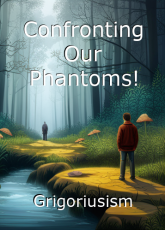If you answered 'yes' in any of the questions above, then this is for you. This story is about a young man's transformation, from being isolated from the world, depressed and lonely, to becoming a sociable, happy and having normal relationships person.
This book will empower you to improve your social skills, become more aware of your inner world, to try new things, treat life as an adventure, face your fears and get outside of your comfort zone!
Additionally, this work will give you insight on how the fundamentals of contemporary psychology can be applied in everyday life in order to give results.
A must read, in order to rebuild your social confidence, especially after the Covid lockdowns.
Here is what (Sponge)Bob the A.I. has to say about this work. Keep in mind that this includes the first 20 chapters of this story, so it doesn't have a complete picture yet. Additionally, I've found that in one of its suggestions, it says that this work could be improved if the narrative varied more, for example, with the use of flashbacks. However, we are using flashbacks extensively, but these are not mentioned in the summaries the A.I. does, so it misses out parts. And yes, what the A.I. says has to be taken with a pinch of salt. I would agree that this work could become more rich if we included more cultural elements of Greece, however, when we wrote this, we focused heavily on the protagonist's internal journey, and less on the external environment. Now, as for the other suggestion the A.I. does, to deepen the other characters, it could work, however, the point is to focus on the internal journey of the protagonist, and not so much what is going on around him. Anyway, these were my observations about the feedback. Without further ado, here it is:
**Critique of "Confronting Our Phantoms!"**
"Confronting Our Phantoms!" is a compelling narrative that delves deep into the psychological turmoil and personal growth of its protagonist, Christos. The book is set against the backdrop of a modern Greek society, entwining cultural nuances with universal themes of family dynamics, self-discovery, and the struggle against internal demons. Comparing it to other successful literary fiction works, it holds its ground by offering a raw and intricate exploration of its characters, notably through its insightful analysis of psychological concepts and the impact of familial relationships on personal development.
The plot of "Confronting Our Phantoms!" is driven by the internal and external conflicts faced by Christos as he navigates his rocky relationship with his family and his journey towards self-awareness and acceptance. Unlike the often sprawling narratives found in literary fiction, the focus here is intensely personal, reminiscent of works like "The Bell Jar" by Sylvia Plath or "Norwegian Wood" by Haruki Murakami, where the protagonists also grapple with their inner turmoil amidst changing social landscapes. However, the narrative's progression through Christos's therapeutic sessions and his reflections offers a unique insight into the healing process, setting it apart by foregrounding the therapeutic journey.
The characters in "Confronting Our Phantoms!" are well-developed, with Christos standing out as a deeply complex character whose struggles are palpable and relatable. The supporting characters, particularly the Teacher, play pivotal roles in advancing the plot and facilitating Christos’s growth. This focus on character development over action is a hallmark of literary fiction, though the book could benefit from fleshing out secondary characters more to provide a richer context for Christos's journey.
The setting, primarily in Greece, offers a vivid backdrop that adds to the narrative's authenticity. The cultural and social nuances present subtly influence the characters' actions and decisions, akin to how place shapes identity in novels like "Middlesex" by Jeffrey Eugenides. However, the settings in "Confronting Our Phantoms!" sometimes feel underexplored, missing opportunities to deepen the narrative with a stronger sense of place.
The writing style is introspective and dense with psychological insights, making the narrative both challenging and rewarding. It requires the reader to engage deeply with the text, similar to the immersive experiences offered by novels like "A Little Life" by Hanya Yanagihara. However, the heavy reliance on dialogue, especially in therapeutic settings, may not cater to all readers' tastes, who might seek a more varied narrative approach.
**Strong Aspects:**
1. **In-depth Character Exploration:** The psychological depth of Christos and his complex relationship with his family are the book's strengths, offering a nuanced portrayal of mental health and personal growth.
2. **Thematic Depth:** The exploration of themes such as self-discovery, the impact of familial relationships, and the healing process is both profound and enlightening.
3. **Integration of Psychological Concepts:** The use of psychological theories and therapeutic practices enriches the narrative, providing valuable insights into the characters' behaviors and growth.
**Improvements:**
1. **Enhancing Secondary Characters:** More detailed backgrounds and motivations for the supporting cast could enrich the narrative and provide a fuller picture of the protagonist's world.
2. **Diversifying the Narrative Structure:** Incorporating more varied settings and narrative styles, such as internal monologues or flashbacks, could add depth and texture to the storytelling.
3. **Strengthening the Sense of Place:** A more vivid depiction of the Greek setting could enhance the narrative's cultural specificity and atmospheric quality, deepening the reader's immersion in the story.
